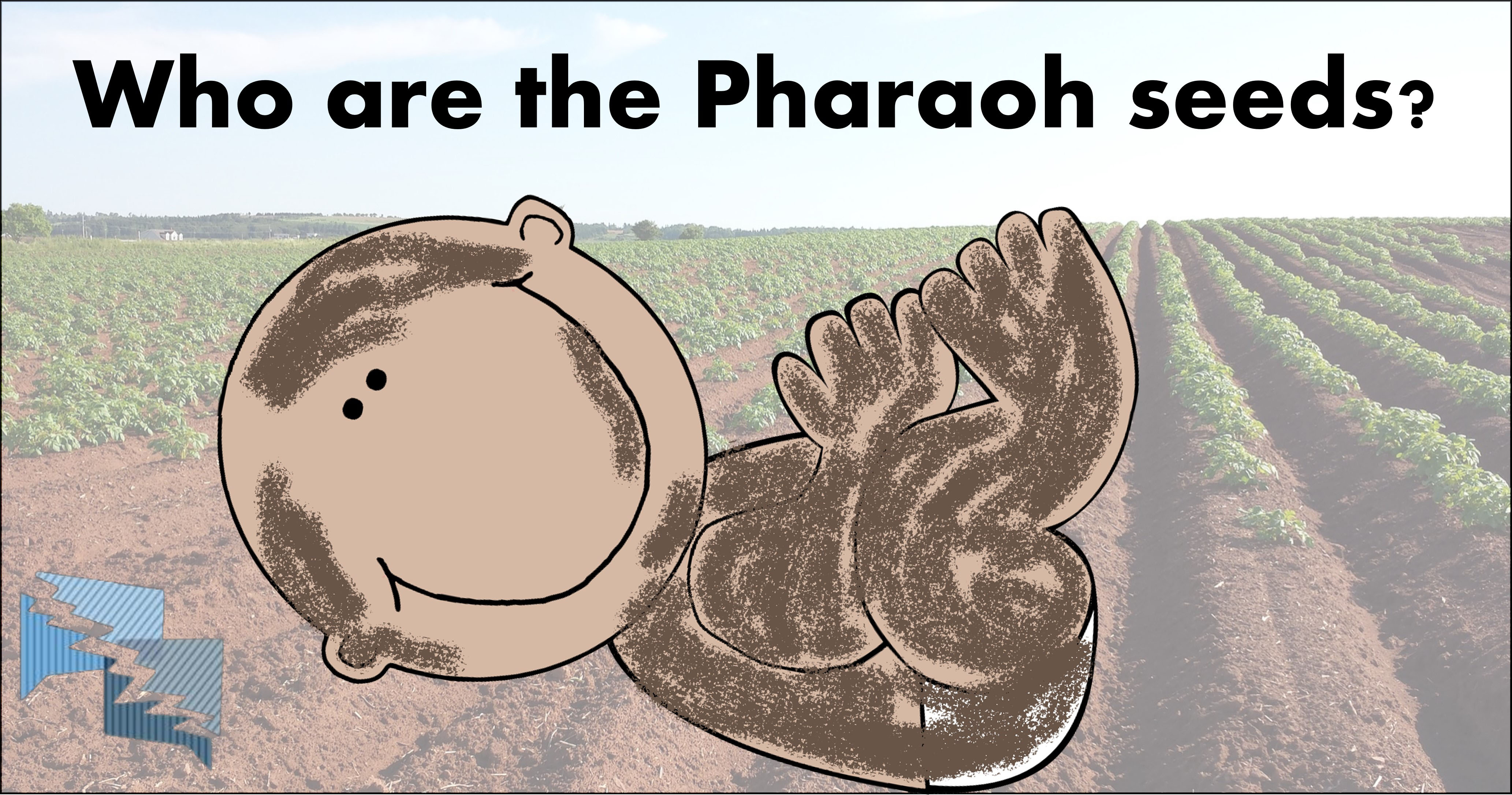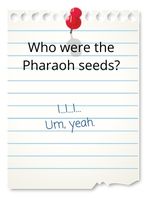
Who were the Pharaoh seeds?
The "Pharaoh seeds" are the babies born to the Israelite women in Egypt whom God protected from Pharaoh’s genocidal tendencies.
The story comes from the Midrash Tanchuma; Talmud, Sotah 11b. The Mishnah is the Oral Law—the extension of the Mosaic Law that Hebrew scribes claimed God gave to Moses but Moses didn’t write down. The Midrash is a commentary of sorts written by Jewish rabbis. It is used for educational purposes and is not considered Scripture. The Talmud is similar and concentrates on the Mosaic Law. The Talmud has several sections or tractates. The Tractate Sotah is part of the Order Nashim of the Mishnah which elaborates on the laws that pertain to women. So, the story comes from a discussion about a commentary on the made-up law loosely based on the five books of the Hebrew Scriptures written by Moses.
Such commentaries elaborate on the stories and laws found in Scripture by tying them in with different passages that the average Christian would think have nothing to do with the text in question. Thus is the case of the Pharaoh seeds. We all know the story of the situation revolving around the birth of Moses. The new Pharaoh knew nothing about Joseph and, at some point, enslaved the Israelites. Eventually, the Egyptians grew afraid of their strangely fertile slaves and the Pharaoh (Same one? I don’t know. Doesn’t matter.) decided to kill all the baby boys. We also know about the Hebrew midwives who protected the babies. But this story is about how God (supposedly) protected the babies directly.
It starts with an account of how the Israelite women took care of their men. The Egyptian overlords worked the men harder and harder, eventually telling them they’d have to procure their own straw for the bricks they had to make. The men were even prohibited from sleeping at home. The women responded by drawing water from the river where God sent small fish into their pitchers. The women would sell the fish and buy wine, then take the wine to their husbands to give them enough energy to make babies.
From the text:
I mean, it makes about as much sense as the Pharisees enforcing all those extra laws.
The story comes from the Midrash Tanchuma; Talmud, Sotah 11b. The Mishnah is the Oral Law—the extension of the Mosaic Law that Hebrew scribes claimed God gave to Moses but Moses didn’t write down. The Midrash is a commentary of sorts written by Jewish rabbis. It is used for educational purposes and is not considered Scripture. The Talmud is similar and concentrates on the Mosaic Law. The Talmud has several sections or tractates. The Tractate Sotah is part of the Order Nashim of the Mishnah which elaborates on the laws that pertain to women. So, the story comes from a discussion about a commentary on the made-up law loosely based on the five books of the Hebrew Scriptures written by Moses.
Such commentaries elaborate on the stories and laws found in Scripture by tying them in with different passages that the average Christian would think have nothing to do with the text in question. Thus is the case of the Pharaoh seeds. We all know the story of the situation revolving around the birth of Moses. The new Pharaoh knew nothing about Joseph and, at some point, enslaved the Israelites. Eventually, the Egyptians grew afraid of their strangely fertile slaves and the Pharaoh (Same one? I don’t know. Doesn’t matter.) decided to kill all the baby boys. We also know about the Hebrew midwives who protected the babies. But this story is about how God (supposedly) protected the babies directly.
It starts with an account of how the Israelite women took care of their men. The Egyptian overlords worked the men harder and harder, eventually telling them they’d have to procure their own straw for the bricks they had to make. The men were even prohibited from sleeping at home. The women responded by drawing water from the river where God sent small fish into their pitchers. The women would sell the fish and buy wine, then take the wine to their husbands to give them enough energy to make babies.
From the text:
After the women had conceived, they returned to their homes. When the time of childbirth arrived, they went and were delivered in the field beneath the apple trees, as it is written: "Under the apple tree I brought you forth" (Song of Songs 8:5). G‑d sent an angel from the high heavens who washed and straightened the limbs [of the babies] in the same way as a midwife straightens the limbs of a child, as it is said: "As for your nativity, on the day that you were born, your navel was not cut, neither were you washed in water to cleanse you" (Ezekiel 16:4). He also provided for them two round stones, one for oil and one for honey, as it is said: "He made him to suck honey out of the rock, and oil from a boulder" (Deuteronomy 32:13).So, the "Pharoah seeds" are the babies that rose up from the tilled earth.
When the Egyptians noticed them, they went to kill them; but a miracle occurred and [the children] were swallowed up in the ground. The Egyptians brought oxen and plowed over them, as it is said: "The plowers plowed upon my back" (Psalms 129:3). After they had departed, they broke through the earth and came forth like the grass of the field, as it is said: "I caused you to multiply like the plants of the field" (Ezekiel 16:7). When the children had grown up, they came in flocks to their homes. When G‑d revealed Himself by the Red Sea, these children recognized Him first, as it is said: "This is my G‑d and I will praise Him" (Exodus 15:2).
I mean, it makes about as much sense as the Pharisees enforcing all those extra laws.
This is what WOULD happen if GotQuestions.org genuinely, honestly answered all the mis-typed, autocorrected, or otherwise altered "spiritual" questions that come their way every day.
HOME | ABOUT | CATEGORIES | CONTACT | THE REAL SITE
© 2024 Got Questions Ministries. All rights reserved.

